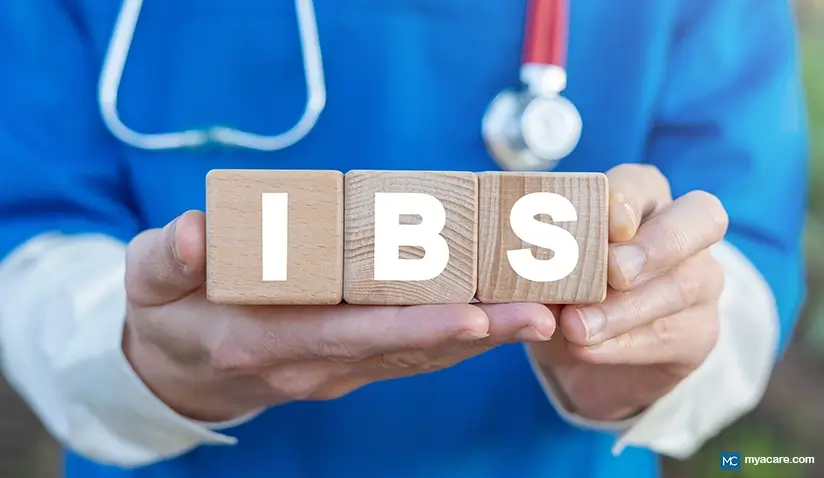Understanding Irritable Bowel Syndrome

Remember the time you had those sudden episodes of extreme abdominal/stomach cramps and had to leave a meeting because you had to urgently go to the bathroom. Or the time when you had bloating and diarrhea with extreme abdominal cramps after a meal. You go to your doctor and after all the examinations and investigations, the diagnosis is that you are suffering from Irritable Bowel Syndrome (IBS).
What exactly is IBS?
The gastrointestinal system is the collection of organs in our body which is responsible for digestion of food and removal of waste products in the forms of faeces. The mouth, esophagus (food pipe), stomach and intestines (intestine is also called bowel) are a part of the gastrointestinal system. IBS is the most commonly diagnosed gastrointestinal condition. IBS is a chronic disease of the gastrointestinal system where pain and change in bowel habits (constipation or diarrhoea) are the primary symptoms. It is the most common disorder witnessed by gastroenterologists in the US and roughly 15% of Americans suffer from symptoms related to IBS.
Causes of IBS:
Despite intensive research, the exact mechanisms for development of IBS are not clear. Some of the factors, which can contribute to the development of IBS, are as follows:
- Stress
- Anxiety disorders and depression
- The organs of the digestive tract (i.e. stomach and intestines) being excessively sensitive to pain
- Infections: Gastroenteritis (infection of the stomach and intestine) is a common trigger for IBS.
- Hormonal fluctuations in case of women
- Dietary factors, which includes ingestion of certain foods, which are poorly absorbed. Some patients of IBS report worsening of symptoms after eating a meal.
- The alteration of the basic processes between brain and your digestive tract may also lead to the development of IBS.
Symptoms of IBS:
- Chronic Abdominal pain – The pain is usually felt in the lower abdomen and is often described as sensation of cramps of varying intensity.
- Constipation
- Diarrhoea
- Other GI symptoms – Patients may also experience bloating, nausea and difficulty in swallowing
Diagnosing IBS:
There is no specific test to diagnose IBS.
Following criteria are used to diagnose IBS:
- A comprehensive medical history of the patient
- Physical examination
- Radiological investigations (ultrasound)
- Laboratory investigations (blood tests, stool tests etc.)
Classification of IBS:
IBS is usually classified into 3 types:
- IBS with constipation (IBS-C) – Patients suffering from IBS-C will have stomach pain, bloating, delayed bowel movements, or hard or lumpy stools.
- IBS with diarrhoea (IBS-D)- Patients suffering from IBS-D will have stomach pain, frequent bowel movements with loose watery stools and an urgent need to go to the bathroom.
- IBS with alternating stool pattern (IBS-M)- These patients have episodes of both constipation and diarrhoea
IBS unclassified (IBS-U)- These patients have symptoms, which cannot be classified into one the 3 subtypes mentioned above.
Treatment:
The treatment for IBS can be divided into pharmacological (drug therapy) and non-pharmacological (non-drug) therapy.
A) Non-Drug Therapy
The non-drug treatment for IBS includes the following:
- Dietary Measures: Patients with pre-dominant constipation should reduce caffeine intake, increase fiber intake and have a judicious intake of water. Patients should also decrease intake of sweeteners like sorbitol. Sorbitol is present in processed foods. Appropriate dietary measures may help to reduce symptoms of IBS like flatulence, bloating and diarrhoea.
- Keeping a daily track of bowel habits and of foods which aggravate the symptoms is also beneficial
- Reducing stress levels
- Meditation, exercise and yoga may also be helpful
B) Drug Therapy
The following medications are useful to treat IBS:
- Anti-diarrhoeal drugs like loperamide and laxatives (drugs which increase bowel functions) are used to treat diarrhoea and constipation respectively in patients with IBS
- Anti-Spasmodics (drugs which relieve intestinal pain) are used to relieve pain in patients with IBS
- Alsoteron, rifaximin and eludaxoline are the medications, which are useful to treat IBS patients with pre-dominant diarrhoea.
- Lubiprostone, linaclotide and plecanatide are the drugs useful to treat IBS patients with a predominant constipation.
IBS Key Points and Take Home Message
- Emotional factors like stress can aggravate IBS symptoms.
- Currently there is no specific test to diagnose nor is there any cure for IBS
- Although IBS can cause a lot of physical discomfort and emotional stress to patients, it does not usually cause serious harm and most patients are able to lead a normal life and control their symptoms.
- Not consuming foods like cruciferous vegetables, beans etc., which can cause gas, help to improve IBS symptoms.
- Healthy diet, regular exercise and reducing stress levels are some of the lifestyle modifications, which can be of great help to patients of IBS.
For more information about IBS, please visit a Gastroenterologist. To find the best Gastroenterologist in India, Thailand, Malaysia, or the UK please visit Mya Care.
Dr. Anand Lakhkar is a physician-scientist from India. He completed his basic medical education in India and his postgraduate training in pharmacology from the United States. He has an MS degree in pharmacology from New York Medical College, an MS degree in Cancer/Neuro Pharmacology from Georgetown University and a PhD in Pharmacology from New York Medical College, where he was the recipient of the Graduate Faculty Council Award for academic and research excellence. His research area of expertise is in pulmonary hypertension, traumatic brain injury and cardiovascular pharmacology. He has multiple publications in international peer-reviewed journals and has presented his research at prestigious conferences.
References:
Featured Blogs



